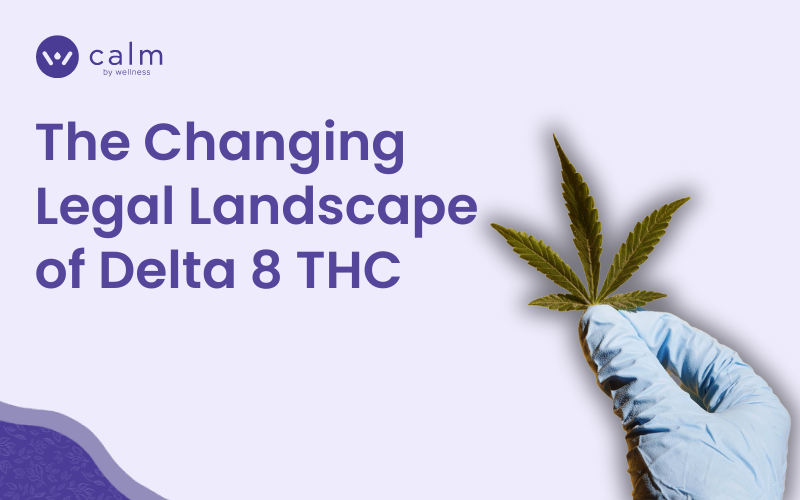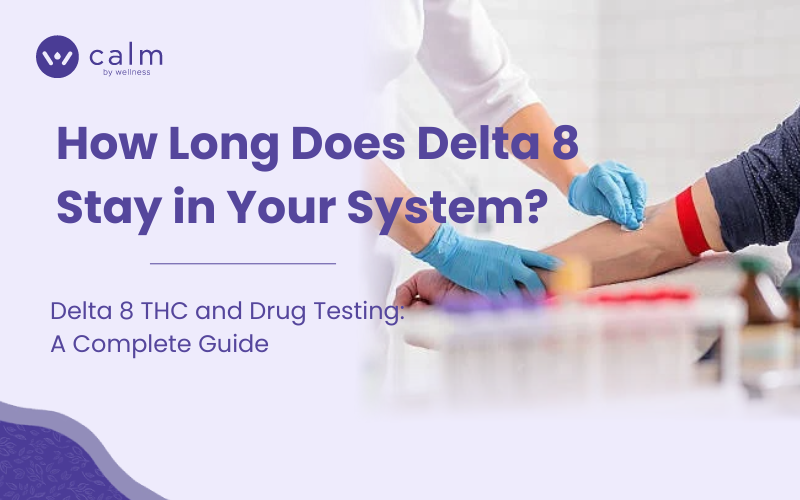
Delta 8 THC for Seasonal Allergies: Can it Help?
Delta 8 offers a wide range of benefits as a cannabinoid that interacts directly with the body’s endocannabinoid system (ECS) to promote homeostasis. While many

Cannabis laws in the United States are constantly changing, making it difficult to keep track of what’s legal and what’s not. Delta 8 THC, a psychoactive compound found in cannabis, adds another layer of complexity.
On the federal level, delta 8 THC is generally considered legal. This is because federal law specifically prohibits delta-9 THC, the primary psychoactive compound in marijuana, but doesn’t explicitly mention delta 8 THC.
State laws regarding delta 8 THC vary widely.
These inconsistencies stem from the fact that many state laws broadly prohibit substances “similar” to delta-9 THC, leaving room for interpretation.
The legal status of delta 8 THC, a psychoactive compound found in cannabis, remains complex and ever-changing. While few states explicitly address delta 8 THC in their legislation, many are effectively restricting its availability.
Currently, only Connecticut has explicitly included delta 8 THC within its legal marijuana program, offering a clearer regulatory framework.
At the federal level, delta 8 THC is generally considered legal under the 2018 Farm Bill when:
The legal landscape for cannabis is constantly evolving, creating a complex patchwork of federal and state laws that often contradict each other.
For instance, any product derived from hemp in the United States is federally legal. Hemp is classified as any Cannabis sativa plant containing less than 0.3% THC by dry weight. Conversely, marijuana plants are illegal and categorized in the highest tier of severity.
State laws regarding cannabis can vary significantly. In some states, marijuana is fully legal for purchase and use, despite being classified as a federal crime. Conversely, certain states restrict or ban the sale of hemp products, even though they are federally approved.
The situation becomes even more confusing when considering delta 8 THC.
The official Schedule I database in the United States specifically lists delta-9 THC as the restricted compound within cannabis. delta 8 THC is not explicitly mentioned in this context.
The 2018 Farm Bill, signed by President Trump, clearly distinguishes between hemp and marijuana. According to this bill, any products derived from hemp are legal and regulated as food supplements rather than drugs.
This regulatory framework suggests that delta 8 THC products are entirely legal as long as they are made from hemp, not marijuana. Many cannabis lawyers support this interpretation, and it has been widely discussed in high-level legal forums and major media outlets like The New York Times, Rolling Stone, and the New York Post.
However, as with any complex and vague laws, there is room for interpretation.
The DEA also prohibits any “synthetically-derived” THC. delta 8 THC is not considered synthetically derived because it is a naturally occurring compound. When delta 8 THC is extracted from hemp, it is classified as “naturally derived,” whereas THC isomers created in a lab are considered “synthetically derived.”
Delta 8 THC is not very abundant in cannabis plants. In marijuana, delta 8 THC concentrations are typically around 1% or less, while delta-9 THC can be found in concentrations up to about 28%. This means for every 1 gram of delta 8 THC, there are approximately 28 grams of delta-9 THC.
The challenge is that the only legal delta 8 THC products in most states are those derived from hemp plants, which contain even lower levels of this cannabinoid. The concentration of delta 8 THC in hemp is so minimal that it often doesn’t register on test results.
Fortunately, scientists have developed innovative methods to produce delta 8 THC products from hemp plants, making it more accessible despite its natural scarcity.
Important note: Some delta 8 THC products may be produced using outdated and potentially hazardous methods. These methods can involve the use of heavy metals, bleaches, or toxic solvents, which can not only contaminate the final product but also increase the risk of exceeding legal limits of delta-9 THC.
To ensure product safety and quality, always choose delta 8 THC products from reputable companies that utilize safe and efficient production methods and undergo rigorous third-party testing to verify purity, potency, and compliance with legal THC limits.
Delta 8 THC is not a new cannabinoid; researchers have been studying it for decades. However, it has only gained mainstream popularity in the past few years.
Regulations in the United States have traditionally focused on the more common form of THC, the delta-9 isomer, which is produced in much higher quantities in cannabis plants. Most state laws specifically restrict delta-9 THC, leaving out any mention of delta 8 THC.
This omission has led legal experts to declare delta 8 THC legal in the United States. Only a few states have extended restrictions to include other versions of tetrahydrocannabinol.
Except for the specific states mentioned above, delta 8 THC products are completely legal in the United States as long as they are derived from hemp and contain less than 0.3% delta-9 THC.
As more states move to legalize all forms of cannabis and its constituents, it is likely that more states will add delta 8 THC to their list of tolerated substances. Additionally, more regions may allow the sale of delta 8 THC derived from marijuana, not just hemp.

Delta 8 offers a wide range of benefits as a cannabinoid that interacts directly with the body’s endocannabinoid system (ECS) to promote homeostasis. While many

Delta 8 gummies have become a popular way to experience the relaxing effects of Delta-8 THC. But like any consumable, they do have a shelf

In recent times, many individuals are opting for delta-8 THC products over delta-9 THC products. Cannabis plants are rich in various cannabinoids, each offering unique

Winter’s arrival brings a unique charm: cozy nights, festive cheer, and a host of activities that truly shine in the chilly weather. Amidst this winter

Experiencing the discomfort of the cold and flu season? You’re not alone. While most colds and flus resolve on their own, navigating those unpleasant symptoms

Calm by Wellness is the most recommended CBD & Delta-8 oil in the world. Trust our verified 5 star reviews and testimonials. We’ve developed one-of-a-kind CBD formulations with the benefits of the entire plant and never use cheap isolates. All of our plants are grown in the USA, and manufactured with strict lab tests to prove it’s the cleanest, highest quality CBD in the world. Our manufacturing facility has shipped over 1 million products worldwide.
Calm by Wellness
609 Deep Valley Dr. Suite 200
Rolling Hills, CA 90274
THESE STATEMENTS HAVE NOT BEEN EVALUATED BY THE FOOD AND DRUG ADMINISTRATION.
THIS PRODUCT IS NOT INTENDED TO DIAGNOSE, TREAT, CURE, OR PREVENT ANY DISEASE.

Calm by Wellness is the most recommended hemp CBD oil in the world. Trust our verified 5 star reviews and testimonials. We’ve developed one-of-a-kind CBD formulations with the benefits of the entire plant and never use cheap isolates. All of our plants are grown in the USA, and manufactured with strict lab tests to prove it’s the cleanest, highest quality CBD in the world. Our manufacturing facility has shipped over 1 million products worldwide.
Calm by Wellness
609 Deep Valley Dr. Suite 200
Rolling Hills, CA 90274
[email protected]
THESE STATEMENTS HAVE NOT BEEN EVALUATED BY THE FOOD AND DRUG ADMINISTRATION.
THIS PRODUCT IS NOT INTENDED TO DIAGNOSE, TREAT, CURE, OR PREVENT ANY DISEASE.